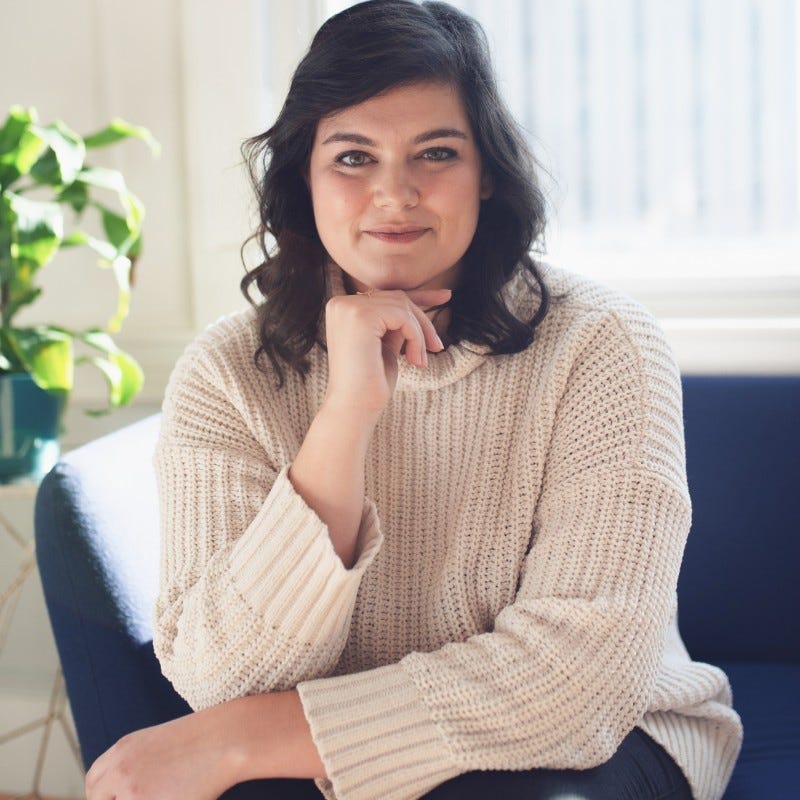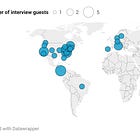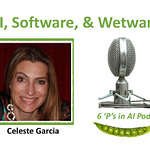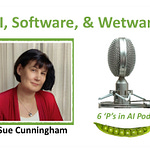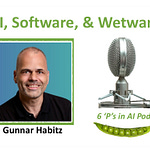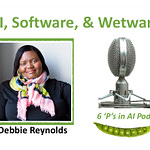Introduction - Melanie Smiley
This post is part of our 6P interview series on “AI, Software, and Wetware”. Our guests share their experiences with using AI, and how they feel about AI using their data and content.
This interview is available in text and as an audio recording (embedded here in the post, and later in our 6P external podcasts).
Note: In this article series, “AI” means artificial intelligence and spans classical statistical methods, data analytics, machine learning, generative AI, and other non-generative AI. See this Glossary and “AI Fundamentals #01: What is Artificial Intelligence?” for reference.
Interview - Melanie Smiley
I am delighted to welcome Melanie Smiley from the USA as our next guest for “AI, Software, and Wetware”.
As a note for our audience, I do know some Smileys that I’m NOT related to (as far as I know 😉). However, in this case, I’m lucky and proud to be able to claim Melanie as my niece by marriage. It’s been such a pleasure to get to know her and witness her talent as a graphic designer!
Melanie, thank you so much for agreeing to join me today for this interview about AI! Please tell us about yourself, who you are, and what you do.
Of course. Thank you so much for having me. My name is Melanie Smiley. I live in Raleigh, North Carolina, and I'm a freelance graphic designer and creative director. I am married to my husband, Tim, and recently gave birth to our first child, Hayden. I graduated with a degree in graphic design from Appalachian State University and since then have worked for retail businesses, media and news outlets, restaurants, hotels, engineering firms, CPAs, travel agencies, and small local businesses. I've designed for clients across the United States and countries worldwide, the furthest even being Uzbekistan.
My latest project was actually in collaboration with Angela Connor. She recently released the inaugural issue of her publication, Ascending Magazine. I worked with her on this project as her creative director and graphic designer, bringing her vision to life and designing this publication from the ground up.1
I saw the announcement for the magazine, Melanie. It looked awesome. [Photo below.] Congratulations!
Thank you so much! It was so much fun.

So tell us, what is your level of experience with AI, machine learning, and analytics? Have you used it professionally or personally or studied the technology?
Of course. So I have used AI frequently in a personal manner. I've used AI to correct grammar and text messages and emails, and to navigate on GPS to new lunch spots, while online shopping, and on social media. I'm sure there are plenty of other ways that AI plays a role in my daily life that I am completely unaware of and just blissfully ignorant of.
Professionally, I have been more hesitant to use AI. As a professional graphic designer, it's my job to create and build something, oftentimes out of nothing. I've designed logos and brands for new businesses, developed page layouts for websites, and laid out menus and catalogs starting from only a blank page. My clients hire me for my creativity and my vision and for my knowledge on how to execute their vision with the resources that I have at my disposal.
Up until this point, I have felt like it would be cheating in a way for me to use AI to aid me in the design process, although I know that many graphic designers do use it as a tool at their disposal. I recently attended a Creative Mornings chat discussing the topic on AI and how we can best utilize it as creatives.2
I posted this dilemma in the chat and received similar responses. People said things like:
“It's just another design tool that you've learned, and it's part of the expertise that you are being paid for, so why does it feel like cheating to you?”
“Did it feel dishonest for you to use Photoshop to make an image look better or InDesign to lay out a page? The client is paying for your expertise in using these tools to generate your creative vision.”
People have said “It's just like any other technology in your field”, blah blah blah, things like that.
So, honestly, I'm still very undecided. I don't think I will ever be able to use AI to generate a logo for me, but I have used AI at my desk to help with other non-billable things.
Yeah, I can understand being undecided, Melanie, and it's interesting to hear about the responses that you got in the webinar chat. What I hear from a lot of creative people is that they want to use any tool that can help them serve their customers, provided the tool is ethical and doesn't harm other creative people. And that part of it is where the quandary usually comes in about using them or not. Can you share a specific story on how you've used a tool that included AI or machine learning features? I'd like to hear your thoughts about the AI features of those tools, how well they work for you or didn't, what went well, what didn't go so well?
Yeah. Of course. So I have used ChatGPT. Actually, a few weeks ago, I sent a potentially uncomfortable email to a client that was having some sort of payment issue. Instead of taking 30 minutes of my time that I'm not being paid for to craft the perfect email response to them, one that would inform this client politely and professionally, I asked GPT to write something for me. I gave it a one-line prompt, and after tweaking its responses 1 or 2 times, I was rewarded with an email that sounded friendly, confident, professional, and kind, all in a matter of minutes.
So I guess any ways that AI can save me time when I'm not billing a client, I would be interested in learning more about.
Yeah, helping you write the payment email sounds like a good use of the tool, and one that really didn't infringe on anybody's rights.
So if you have avoided using AI based tools for some things or for anything, can you share an example of when and why you chose not to use AI?
Oh, yes. I have seen many people on social media discover that they can generate custom logos on certain AI platforms. To me, this seems like kind of a sneaky move.
I'm not saying you have to spend hours designing dozens of design options in order to be legit, but with the lack of research and intentionality and, honestly, human touch, it doesn't really seem like an appropriate process to me.
Yeah. This is one of the areas that people talk about a lot. Some people claim that these tools are democratizing the creative arts so that anybody can do it themselves without hiring a creative professional. Anybody can write a song. Anybody can generate a logo. Anybody can write a book.
But there are two main concerns. One, is the output really any good or good enough for its purpose? And two, is the tool built and used ethically?
And also, the whole point of these things is creative expression. And so that's part of what we're doing as human beings. So why would we give that empowering process to a machine? Like, what's the point of even having them do it? I mean, I guess people are just using it to make money instead of to actually express themselves creatively. As a creative person, that is frustrating, to see this process being taken advantage of and just monetized in that way.
Yeah. And the second current concern that comes up is, is the tool built ethically and is it being used ethically?
I don't know how they train AI for these creative tasks. Are they feeding other designers' art into the computer to teach the programs how to better generate these logos? It seems like a copyright issue to me.
Yeah. You're exactly right, Melanie. This is how AI tools are trained for creative tasks, but it's absolutely a copyright issue. There are over 30 active lawsuits in the US today about how creative content was illegally ‘scraped’, is the term they use, to try to teach these AI tools to generate art and music and words.3
I'm curious. In your Creative Mornings chat, was there any discussion about the ethics of how the AI tools were built or where the images came from that were used to train it?
Yes. So Phil Pallen was the man leading the Creative Mornings, and he definitely had some recommendations on AI tools that were specifically trained ethically. And he had the research to prove it. And so he only recommended using those tools to us. So he didn't bash any of the tools that don't use it, but we got a lot of information on the tools that are ethical, and they are appropriate for us as creatives to promote and to use.
I am really happy to hear that he did that. That would be actually a great list to have. I don't know if it's proprietary to Creative Mornings or if it could be shared? I also try to promote when I find tools. For instance, I've been looking at ethics of AI and music. And when I find an ethically-trained music tool, I try to promote it. Because I think people who are trying to do the right thing deserve extra attention, because they're fighting an uphill battle against the really big, well-funded tools that aren't behaving ethically.
Exactly. Well, I do know that he has just written a book, and I know that that is being released soon. So I'm sure if you wanted to look more into it, you could visit his book and read more about it, because he was very passionate and very clear on that topic of the importance of the ethically sourced AI.
I'll find the link, and maybe we can even include a link to his book in the article.4
Of course. Yeah. That would be awesome.
We've talked a little bit about this already, but how do you feel about companies that are using data and content for training their AI and ML systems and tools? One thing that's being discussed a lot is whether ethical AI tool companies should be required to give what they call the “3C's” for creative rights, which is “Consent, Credit, and Compensation”, and to give those rights to the people whose data they want to use for training.5
I do believe that if AI is benefiting from the work of artists and designers or really anyone in any field, that those contributors should be fairly compensated, obviously. I think stealing others' work to allow others to replicate and then profit from it, I think that should be a crime.
Yeah. Absolutely. And that's exactly what those 30-plus lawsuits on AI are about is bringing up the attention to the fact that these models haven't been trained fairly and to try to get the compensation.
Yeah. I mean, as an artist, I'm often inspired by the works of other people. I will often search the Internet to see what's been done before starting a project, but I do this to educate myself on what already exists and to challenge myself to create something new, not to copy the art another designer has given their time to perfect.
Yes. And this is exactly how humans learn and how ethical artists work. And one thing that you'll probably hear is that some people claim that AI is just learning like humans, but it's not. We don't ingest billions of pages or images or text and mash them up and then spit out pieces of that content when we're prompted for it. And then when we do want to reuse a small part of something that we've seen, we ask for consent, we give proper credit, and then we compensate the creator for the right to use it. And, again, this is what people are calling the 3C's of creative rights.
I like that.
Yeah. And so a lot of the initiative behind the ethical AI movement and these lawsuits is to try to force companies to observe the 3C’s and the rights of creative people.
Yeah. That's hard to do, though.
It is hard. But, you know, AI is already hard.
Right.
Being able to pay for the source material that you use to create something which can offer so much value is only fair. Otherwise, the whole ecosystem of people creating content or sourcing goes away. If artists can't make a living from work, then they stop creating the original art that goes into it, and it starts eating itself and disintegrating.
Yeah.
They call it ‘model collapse’. It's very interesting. But in order to have a healthy ecosystem of creative content, humans have to continue to be involved in creating it. It seems obvious, right?
Yeah. And not to always feel like they're being motivated by financial gain. Like, I want people to just feel like they can create for the sake of creating and not training machines or for the sake of making money, which is really hard. Especially since COVID, the whole side hustle and making passive income, like, it's become such a trend and such a demand.
Like, people really want to do that. Everyone was making clay earrings at one point. And why can't we just do art for the sake of making art, and for expressing ourselves, and for playing like kids? Why do we always have to try to start businesses making clay earrings?
I hadn't heard about the clay earrings - that's interesting.
It was a huge trip. I know, like, 3 or 4 different friends who started businesses during COVID, small businesses devoted to clay earrings, which the first few people who did it, I was like, “Wow, like, that is so cool. You can make an earring out of clay. That's beautiful!” But then I started noticing everyone doing it. They were all doing the same shape. So that's the other thing is the market became so over-saturated. Everything looked the same.
What you're describing there with the market being saturated with the poor quality content - that's exactly what's happening in the area of music. There are people who are using these tools to generate hundreds and thousands and millions of songs. And they're just swamping streaming services like Spotify to the point where legitimate human musicians can't get their songs heard. It's just drowning them out.
Music, I think, is interesting because we're almost better-positioned legally to defend the rights of musicians, in some of the cases, than we are for other creative arts. So I'm kind of hoping that we'll break some ground there in terms of what's legal and what has to be done to get consent from people before their work is used in an AI system. And that will then extend to other creative arts, because why wouldn't it?
Right. I wonder if it's easier to prove cases of copyright issues with music, as opposed to art, because you don't know what I've been inspired by. That's very interesting. It's an interesting sect of all of this conversation.
Yeah. Yes, it is! So as someone who's used AI-based tools, do you feel like the tool providers have been transparent about sharing where they got the data that they used for the AI models? Or whether the original creators consented to it being used?
I don't really know about this. I honestly haven't taken the time to read the terms and conditions, and I'm not sure where these providers of the tools that I even claim to use get their information. So I feel like I'm not really a great source for that. My experience is that I haven't taken the time to thoroughly research it.
And that experience is super common. There's a recent study that showed that 91% of people don't ever read the terms and conditions. And they're usually pretty difficult to digest even if you try to, because they tend to be 10 or 15 pages of legalese that humans don't really understand.
And there was actually a case where some lawyers were trying to evaluate an AI based tool to help them with their law work. And the lawyers didn't understand that the terms and conditions would be exposing their clients' confidential information to the people that run the AI tool. And they're lawyers, and they didn't figure out that that's what the terms and conditions were doing. So if they can't figure out [both laughing], right, what hope is there for us non-lawyers to be able to read these 10 or 15 pages and figure out what they mean? Terms and conditions are really a bad way to get consent, especially if it's meant to be informed consent, right?
And most tool providers simply don't tell us much about where they get their data. So you have lots of company on either not reading or not understanding. Honestly, if you can't understand them, why spend the time to read? I do because it's my area of work, but I can totally understand why most people don't.
I'm thankful for people like you who do take the time to read it and then can sum it up to people who wouldn't understand, even if I did sit there and read it.
Yeah. There's someone that one of my friends, Tracy Bannon, referred me to. The guy had a podcast last year where he got the terms and conditions from 10 different major companies, and he pulled in a lawyer and said, “Okay, explain this to me. What does this mean?” It's called “What's in my EULA?”, E U L A, the end user license agreement. So he has this podcast with 10 episodes that explain what's in these, and it's really eye-opening. I'll put the link into the interview.6
Yeah.
Because you do need a lawyer to understand them, in a lot of cases, you know?
That is crazy. That's very cool. I like that. I will definitely check that out.
Yeah. So as members of the public, there are cases where our personal data or content may have been used, or already has been used, by AI based tools or systems. Do you know offhand of any cases that you could share?
None that I'm aware of. I mean, I know that Facebook and Instagram, they use our personal data, and I know that people warn us not to post pictures online that we wouldn't be okay with being out in the world forever and ever and ever. So I'm aware of that. But I also don't know all of the reasons why I should be wary of social media. So I continue to post pictures of my family.
Maybe I should do more research into that. Maybe I should be more wary and self-conscious. But for right now, it's the main way that I can stay connected to family and friends. And so for me, it's just a way that they can watch my child grow up and then they can still see what I'm doing. And I'm not ready to let go of that link to them. But I don't know. That might just be my ignorance talking.
Yeah. So I think there's probably 2 different cases. And one is, professionally, you use Instagram and you put content out there to try to share your work and to help potential clients understand what kind of work that you do. And so that's one case. And there, I think the way to look at it is that the AI-based tools could scrape something that you've created, and then put that into a generative AI tool. And then someone can generate something that looks like Melanie Smiley's work without having to pay you for it. And so that's where putting the images online can be risky.
There are actually some new tools that have been developed. They do what they call ‘poisoning’ the images. So that people can look at them and they look like the pictures. But if an AI model tries to take the digital content of that picture and use it, it won't work.
That's amazing!
Isn't it? Yeah. But there's some concern that it can become a bit of an arms race - where the poisoning tools get better, and people figure out how to get around the poisoning tools, and then the poisoning tools get better, ... So it's certainly not a guarantee. But I have talked with some people, professional and nonprofessional artists, who have started using those tools to try to protect their work so they can still share it, but they're not at risk of it being scraped and stolen and used in an AI tool.
I'll put some links to those tools into the interview for you and share them with you so you can check them out.7
Yes. I would totally use that. I do have a question. What's the difference between me posting to social media versus posting on my online portfolio? That's just my own website. Can AI still learn from that?
Absolutely. Yeah. Now there are ways to try to instruct with your own personal website. Whoever's doing your website administration can put special files into your site to tell - they call them the ‘bots’ or the ‘crawlers’ that are running through the web looking for stuff - you can say, “You do not have my permission to take this content”.8
That will help. But there are still some unethical bots who ignore that. This is an area that is very actively evolving, trying to find ways to truly safeguard content that's out there.
With your own website, your site administrator should have the control to be able to put these special files in to say, “Don't scrape the content from this site”.
With Instagram or the other sites, some sites will have permissions to let you say, “You do not have the right to train on my data”. On a site like Facebook or Instagram, it's interesting because in Europe, they have something called GDPR, which is a data privacy protection regulation. People in Europe are protected from having their content scraped. We, in the US, are not, because we do not have GDPR or something like it yet.
Interesting.
I'll say ‘yet’. It's being worked on. So that's one difference.
But if you post something, some of it depends too on the privacy settings, your Facebook settings. Or a family member who tags you, if they post something as Public, anybody can see that, any crawler can get it. They don't need an account.
So at least setting it so the permissions are limited to, say, your friends or your friends of friends, that is better than having it marked as Public. So that's maybe something to look into, where you wouldn't have to lose that connectivity. I enjoy seeing your pictures of your baby, and you too!
Well, yes, that's very interesting. I've always just kind of taken the privacy settings with a grain of salt. I know that it matters to a certain degree, but also part of me is just like, well, any creep could get their hands on my pictures no matter what my privacy settings are.
And now that I realize that it's not just posting on social media, my own portfolio website is at risk to falling under this. That's not comforting news either, because I never even thought of that. I was just focused on the social media part of it, because that's more well known to me.
Yeah. And I've got some other resources I can share with you too. One of my friends in Italy, she started a group called “Data Girl and Friends” to try to help both parents and kids understand how to protect their information online and how parents can protect their kids' information. I'll share some links about that as well.9
Yeah. Bless your heart! You're going to be sending me a whole document worth of links.
I'll put the links to the interview too, so that people who read and listen to this can go get that information. I think the awareness is growing, of understanding that, if we give information to a company or if we post something, that it is being shared and used in ways that we maybe didn't realize.
I use the phrase that AI is like an iceberg.10 There's some things that we see. We see that there's ChatGPT. We can see robots at these showcase events like CES and the robot conference.11
But then there's so much that's underneath the waterline that we can't really see. We don't know what they're doing with our data. Or we don't know that a recommender system tells you what to watch next on Netflix and what data it got about you and how it's using it, things like that. So, yeah, it really is everywhere.
Yeah. And just because I consider myself a small fish doesn't mean that I'm exempt to it.
Yes. Exactly.
Yeah. That's crazy.
Yeah. Do you know if a company's use of your personal data and content has ever created any specific issues for you, such as privacy or phishing or loss of income?
Not for me. So far, the only time I have seen my designs used in an inappropriate way was from another designer, copying the style of an Instagram post I made. However, that gets into a whole other thing for designers, the line between stealing and being inspired by. It’s a whole conversation in the graphic design world and the artist world. It's a very fine line that we walk between those things.
Would you like to expand a little more on that?
Yes. Will it be a coherent thought? [both laughing] I don't know. But for us as designers, oftentimes before we start projects, we look for inspiration.
So, for example, if a coffee brand approaches me and they want me to design a logo for their new coffee shop, what I would do first would be to look at other coffee shops in the area, and kind of compare what styles they're doing, and what their brand is doing. Because, obviously, I don't want to copy another coffee shop in that immediate area; that would not benefit my client at all. But sometimes what I would do would be to look in a market who's very similar, but on the other side of the country or even in a different country, and kind of see what those coffee shops are doing. And, again, not copying anything, but to be inspired by elements of it. So, like, maybe this coffee shop chose to go with a retro style, and I really like that retro style, but they were representative of the seventies. I wanted to go more fifties style.
So kind of pulling inspiration from, without directly just being like, “Oh, you used orange and white and gray in your logo. I'm going to use orange and white and gray in my logo. I'm just going to tweak the hex codes a little bit.” You know, like, there is a fine line. I went to school for graphic design and I feel like that's something that we learned in school was how to be inspired by and to pull elements that we like from other brands.
Even, for example, in this coffee shop illustration, you could use other industries. So not just coffee shops, but like a carpet brand who just happens to be very modern, for example, and pulling elements from that.
So figuring out how to fuel my creative mind while also respecting the integrity of other designers who I admire and their work, and really finding a balance. And also infusing a lot of my own creativity and my own opinions, but also what my client wants and what they want their voice for their business to be. So there's all these different elements that I'm juggling and there's a lot to be taken into account when you're designing a logo.
That was coherent!
Okay! Good. Awesome.
That was a great explanation about the way that graphic designers think. I never had any kind of art or graphic design training myself. The only creative thing I've ever done is just photography, and that's totally different. So it's really interesting for me to hear about how you're deliberately selecting what you put into a design and the different things that you try. So thanks for sharing that. I'm learning something.
Of course. And like I said, all of those things that go into it, and that is just a part of the process. Does AI, when they're spitting out logos for whoever, do they take all of those things into account? And is the person who is using this tool, because now that they have access to this AI, they can create logos too. Does that person know all of the stuff that goes into making a solid brand and how to execute that and how to really elevate your client and meet their needs?
That is another thing that I think people are forgetting about when they're using these tools to mimic what a graphic designer does. They don't have the knowledge all the time. Sometimes they do, but they might not have the knowledge that they need to help their clients truly succeed. They have the knowledge that they need to help their clients have a logo and therefore have a business card, but there's no brand strategy there. And, ultimately, it might not work if you're just following trends.
Yeah. That's a great overview, so thank you for sharing all that.
Yeah. Of course!
So part of what we're seeing is that public distrust of AI and tech companies is growing. And I think it's healthy in a way, because it means that we're starting to understand exactly what they're doing with our data, and how they're using it, and whether they've gotten the consent from the people whose data they're using, and such.
If you think about the AI and tech companies that you work with, what would be the most important thing that they could do to earn and to keep your trust?
Definitely being transparent about how they're training their AI. For someone like me, I would want to see behind the scenes on how they do it. I'm a very visual learner, and I'd rather they show me a 3-minute clip on YouTube of how they train their AI in an appropriate way, versus me feeling guilty over not reading the 10-page terms and conditions before using. I'm never going to do that. I don't have the time for that. But I would love to see how they do it and I do find it to be very interesting. So I do think there's potential there for them to really incorporate us as the user into their process by showing us what they're doing.
Yeah. And I think that an explainer video that says what the terms and conditions really mean would be awesome. I would love to see people do that, myself.
Yes.
Just to explain the overall AI process. I'll look around, and I'll see if I can find one. If there isn't one, maybe I'll try to create one. The thing is: the overall process of how you train an AI model, I can explain that, but the real guts of it comes down to: where do they get the data?
I did see one example today on LinkedIn where IBM was saying, here's all the data that we got, and here's where it came from. And that's awesome. I'd love to see more companies doing that.
Yeah. That is awesome.
Yeah. Melanie, thank you so much for sharing all of that insight with us today about graphic design and AI. Is there anything else that you'd like to share with our audience?
Sure. Of course. I had a blast. I totally learned a lot during this interview, and so I appreciate you bringing me on. The only thing that I would say is to encourage everyone to just really dive into this stuff for themselves. Clearly, I have not done that, and I'm very convicted by my lack of knowledge in this topic professionally and personally, how my images are being dispersed throughout the Internet. I know that to some degree, I don't have a ton of control over it, but to some degree, I do. And I know that I need to be better about that. So that is something that moving forward, I will definitely be paying more attention to, and, hopefully, I'll clean up my act.
Well, I think people shouldn't have to understand how AI works. It's like - you shouldn't have to be a mechanic to be able to drive a car safely, right?
That's true. That's a good point. That alleviates some guilt from me!
Well, learning to ask good questions about - for instance, you were mentioning that Phil brought up that list of ethically trained tools. He did the work to figure out which ones were ethically trained and which ones weren't. But if you hear about a cool new tool: Where did they get their data? And did the people consent to it?
Learning enough to ask the good questions about it - what they call AI literacy or data literacy, that we all need to build - is just learning to be a good driver, not having to be a mechanic.
Yeah. That's a great way of putting it.
Alright. Thank you so much, Melanie. I really enjoyed talking with you today, and I'll talk to you soon!
Yeah. Thank you so much.
Thank you!
Interview References and Links
Melanie Smiley on LinkedIn
Vivid Graphic Design
About this interview series and newsletter
This post is part of our 2024 interview series on “AI, Software, and Wetware”. It showcases how real people around the world are using their wetware (brains and human intelligence) with AI-based software tools or being affected by AI.
And we’re all being affected by AI nowadays in our daily lives, perhaps more than we realize. For some examples, see post “But I Don’t Use AI”!
We want to hear from a diverse pool of people worldwide in a variety of roles. If you’re interested in being a featured interview guest (anonymous or with credit), please get in touch!
6 'P's in AI Pods is a 100% reader-supported publication. All new posts are FREE to read (and listen to). To automatically receive new 6P posts and support our work, consider becoming a subscriber (free)! (Want to subscribe to only the People section for these interviews? Here’s how to manage sections.)
Enjoyed this interview? Great! Voluntary donations via paid subscriptions are cool; one-time tips are deeply appreciated; and shares, hearts, comments, and restacks are awesome 😊
Series Credits and References
Audio Sound Effect from Pixabay
chatgptiseatingtheworld.com/2024/11/09/updated-map-of-copyright-lawsuits-v-ai-companies-nov-9-2024/ (via LinkedIn post by Edward Lee) TO DO (K): Add link to info on lawsuits
“AI for Small Business: From Marketing and Sales to HR and Operations, How to Employ the Power of Artificial Intelligence for Small Business Success (AI Advantage)”, Phil Pallen, to be published Jan. 14, 2025
Mark Miller’s EULA podcast: eula.thesourcednetwork.com/about/
Nightshade and Glaze tools from the University of Chicago (for protecting images posted online)




